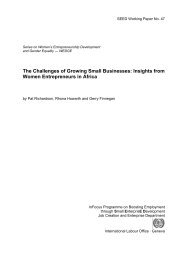manual: women workers' rights and gender equality - International ...
manual: women workers' rights and gender equality - International ...
manual: women workers' rights and gender equality - International ...
Create successful ePaper yourself
Turn your PDF publications into a flip-book with our unique Google optimized e-Paper software.
The strategies traffickers often use are:<br />
• promising to provide good employment<br />
• false marriage<br />
• visiting relatives<br />
• promising better/higher education<br />
• promising good food/nice jewels etc.<br />
• threat<br />
• abduction<br />
• drugging<br />
The reasons why <strong>women</strong> <strong>and</strong> girls are trafficked are not only for prostitution. There are more reasons<br />
like:<br />
• factory work<br />
• domestic work<br />
• farm work<br />
• work in the entertainment industry, including pornography<br />
• hotel/club labour<br />
• work in massage parlours <strong>and</strong> karaoke bars<br />
A good way of fighting trafficking in all its forms is group formation within the community. Motivate<br />
others to fight the problem. Be aware of people who make promises that sound too nice to be true,<br />
warn others if such persons show up. Inform children <strong>and</strong> youth that they should be aware of<br />
persons who make nice promises <strong>and</strong> that they should not go with strangers whatever they<br />
promise.<br />
When you decide to go with someone, despite all those warnings, you should inform your family or<br />
other (official) people you can trust. Make sure that you have the name of the person who takes<br />
you <strong>and</strong> your destination. If you do not trust the whole situation when you are already on your way,<br />
try to get to the police, a <strong>women</strong>’s group or health post as soon as you get a chance. Make sure<br />
you know your address <strong>and</strong> your telephone number so you can always tell where you come from<br />
<strong>and</strong> people can contact your family. This is especially important for children, they often do not<br />
know where they come from exactly <strong>and</strong> this makes it more difficult to rescue such a child. Very<br />
important is also that you should never ever give away your identity card or your passport. Always<br />
keep separate copies of these documents.<br />
Often, returning victims of trafficking face problems in their family <strong>and</strong>/or community. The family<br />
<strong>and</strong> community have an important task here to help the victim to find a place in society again.<br />
There are a number of NGOs who can help in this respect. They provide health services <strong>and</strong><br />
training <strong>and</strong> sometimes they provide resources to the victims to build up their life again.<br />
Contacts<br />
Cambodian Women’s Crisis Centre (CWCC) telephone: (023) 982 158, or mobile numbers 012<br />
787 509 <strong>and</strong> 012 947 186. Agir pour les Femmes en Situation Precaire (AFESIP) can be contacted<br />
at (023) 884 123 or (023) 368 644. The Ministry of Interior has special police trained to intervene in<br />
cases of sexual exploitation. Their 24-hour hotline number is (023) 720 555 5 .<br />
Related sessions <strong>and</strong> briefing notes<br />
4.9 Migrant Workers<br />
Briefing Note 6 Rights, Laws <strong>and</strong> Rules<br />
5 H<strong>and</strong>book on Women's Empowerment through Legal Awareness, Gender <strong>and</strong> Development for Cambodia (GAD/C),<br />
2002, Phnom Penh, Cambodia<br />
91

















